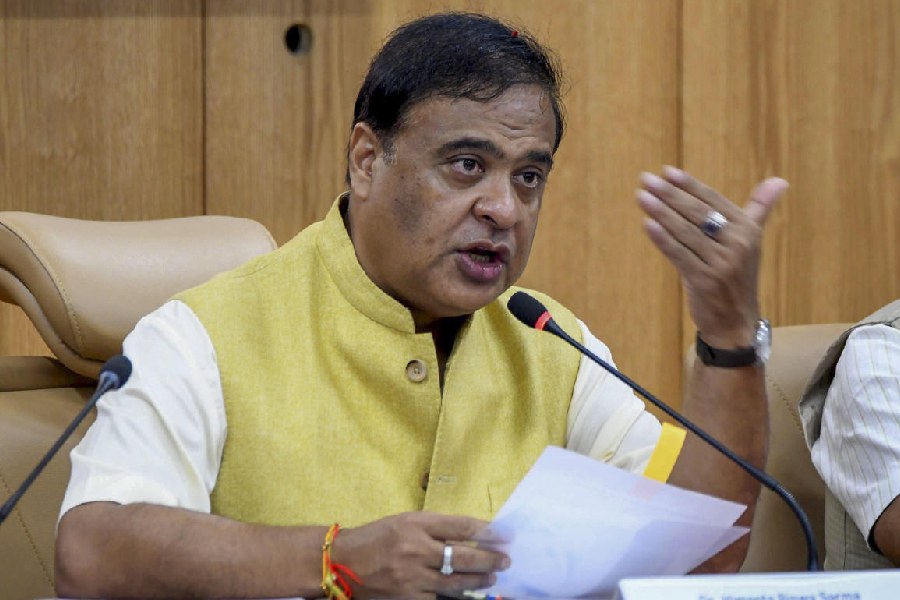 |
| Former minister Bachcha Singh at a dharna demanding changes in the CNT Act near Raj Bhavan in Ranchi on Wednesday. Picture by Hardeep Singh |
Ranchi, Feb. 22: Chief minister Arjun Munda will not admit it, but as the political divide widens over the Chotanagpur Tenancy (CNT) Act, his backroom managers are working towards a formula of least resistance to resolve the controversy over the 1908 law governing the sale of land in Jharkhand.
“It is both a legal as well as a sentimental issue. So, it will inflict an irreparable damage if we come out with a hasty solution,” Munda told The Telegraph.
Political parties began taking sides soon after Jharkhand High Court, on January 25, made deputy commissioner’s consent mandatory for transfer of land belonging to backward classes and Scheduled Castes in the context of the CNT Act. The restriction was earlier applicable to land owned by tribals only.
As way out, the state government is now toying with the idea of revisiting a 1962 list of backward classes, issued by the then Bihar government, whose land had been restricted for sale under the act.
As many as 51 castes were notified by the Bihar government in 1962, 24 of them inhabiting districts of Jharkhand, following the introduction of a provision for restriction on the sale of land belonging to backward classes.
At present, the state government has classified 141 backward castes, including 104 as extremely backward and 37 as backward, for the sake of reservations in jobs.
According to sources, the CNT Act talks of backward class and not caste. “So, the government will go for fresh identification of backward classes on the grounds of social, economic background and geographical region and restrict the transfer of their land,” said an aide of the chief minister.
For example, a person classified as backward in Palamau may not come under that category in Ranchi, he explained, adding that the government’s exercise would basically expand on the 1962 list.
Munda was tight-lipped about the formula, saying it would be revealed at an appropriate time, but insisted that the CNT Act could not be repealed by the state government, referring to the demand of former chief minister and JVM chief Babulal Marandi.
“The act had been listed in the Ninth Schedule of the Constitution. So, it can be repealed by Parliament only. Also, the act is beyond judicial review. The state government can make only an amendment to it,” he pointed out.
So far, the CNT Act has been amended as many as 26 times, the last time in 1995.
Marandi has demanded that the state government constitute a panel to review and frame a fresh law on tenancy to suit the present day circumstances. Various tribal outfits have also come together to oppose any change in the law, while non-tribal outfits, under the banner of Jharkhand Bachao Sangharsh Morcha, are pushing for changes.
The Morcha, headed by former urban development minister Bachcha Singh and Uday Shankar Ojha, staged a show of strength in front of Raj Bhawan today, demanding that the Governor take an initiative to change the law.
Given the politically surcharged atmosphere, the state government is in no hurry to act. Munda said political parties (read JVM) as well as individual leaders (read BJP’s MLA Raghubar Das) were raking up the issue to shore up their political stocks.
“But they should avoid it as it happens to be a legal and sentimental issue and not a political one. We are assessing the situation and working out a formula. We will work out a solution within the legal frame work,” he maintained.
Sources also said the state government was buying time due to forthcoming by-elections in Hatia as any decision would have an impact on its outcome. Also, Munda faces a huge dilemma on taking a stand on the issue as the JMM, an ally, is opposed to any change in the CNT Act.
The other ally, Ajsu, a party thriving on the Kurmi (a backward caste) vote bank, is also maintaining a studied silence.
Munda’s inaction, however, has angered the Opposition, including the Congress, which said that the government’s silence would widen the gap between tribal and non-tribal groups as both would intensify their agitation.
State Congress president Pradeep Balmuchu said the chief minister should immediately call a meeting with the members of backward classes and scheduled castes to know their views on the issue.
“But the government should not take any decision that will affect the development of the state,” he maintained.










